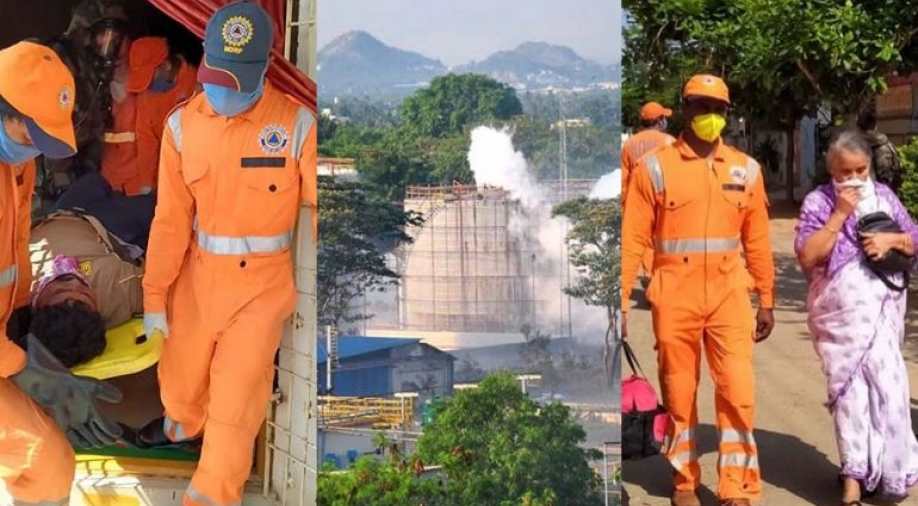
Lapses in safety protocols: Vizag gas leak was a disaster in waiting
Reminiscent of the 1984 Bhopal tragedy, a gas leak from a polymer plant in the coastal Andhra city of Visakhapatnam, claiming 11 lives and affecting hundreds of people, was a disaster waiting to happen.

Reminiscent of the 1984 Bhopal tragedy, a gas leak from a polymer plant in the coastal Andhra city of Visakhapatnam, claiming 11 lives and affecting hundreds of people, was a disaster waiting to happen.
Several environmentalists have pointed out that serious lapses in safety protocols and flouting of environmental norms had led to the tragedy.
The South Korean-owned LG Polymers, from where the gas leaked, makes polystyrene and co-polymers by using styrene, a flammable liquid gas, as raw material. The plant is located near Gopalapatnam, about 15 km from Visakhapatnam.
“In a glaring lapse, the State Pollution Control Board had last year given permission for expansion of the plant operations without apparently obtaining clearance from the Union Ministry of Environment,” former Union Energy Secretary and environmentalist E.A.S. Sarma told The Federal.
The retired IAS officer suspected a “nexus between the plant management and official agencies” over the former’s expansion plans and called for a thorough probe to ferret out the truth.
“The pollution controls were lax at the plant,” he said.
In fact, the company was involved in litigation with the state government pertaining to a portion of the land that it occupies.
“Ignoring this ground reality, the pollution control board reportedly granted consent for establishment and consent for operation for the unit’s expansion,” Sarma said.
Related news: Andhra gas leak: 500 kg of PTBC flown in to neutralise styrene’s effect
He alleged that the South Korean company was “constantly pampered” by the successive governments despite the plant being a highly polluting one and located in the midst of a residential area.
A spokesman of the CPI-affiliated All India Trade Union Congress (AITUC) J.V.V.S. Murthy alleged that the chemical plant had encroached 12 acres of government land.
“When we agitated demanding that the government redeem the land from the company, the police filed cases against protesters while the encroacher was allowed to go scot-free,” Murthy said.
The initial reports suggested that several people living in five surrounding villages fell unconscious after inhaling the poisonous fumes. Some of them are still battling for life in hospitals in the coastal city.
“In the first instance, this unit being a highly polluting one and its being close to residential areas, the pollution control board should not have allowed it to expand its operations,” Sarma said.
No warning
The trade union leader alleged that the plant officials had failed to alert the people in the locality when a thick cloud of toxic gas began to come out of the factory.
This is not the first industrial accident to take place on the outskirts of Visakhapatnam.
“Around 30 to 40 accidents took place in the past but no one was prosecuted and no government officer punished for lapses. It implies collusion between the officers and the promoters of the polluting industries. I would not be surprised if the promoters have had support from the political leaders of all hues,” Sarma said.
The plant had apparently secured a No Objection Certificate (NOC) from the authorities to reopen post-lockdown, claiming to be an ‘essential industry.’ “How could the officials think that a plastic manufacturing company is essential?” the former IAS officer said.
The chemical plant falls under orange zone and was allowed to restart its operations following relaxation of lockdown guidelines.
Related news: Vizag styrene gas leak: How the tragedy unfolded
The management had allegedly failed to follow the protocol before resuming the plant operations. As per the procedure, they are required to carry out safety checks in the presence of officials from the Department of Industries and pollution control board before resuming operations.
LG Polymers is no stranger to controversy. In 2000, a reactor blast shook the surrounding villages but there were no casualties. In 2017, the villagers made a representation to the Rajya Sabha MP Subbarami Reddy, seeking action against the company for polluting the environment.
However, the pollution control board gave clean chit to the company after inspection.
There are allegations that the company has handed over critical operations to untrained casual workers. When the leakage happened, the casual staff, with no experience in re-staring the polymer plant, was present at the factory premises.
“It seems unskilled labour mishandled the maintenance work, leading to the gas leak,” the commissioner of the Greater Visakhapatnam Municipal Corporation (GVMC) Gummalla Srujana said.
Company statement
In a statement, LG Polymers said that stagnation and changes in temperature inside the storage tank could have resulted in auto polymerisation and caused vaporisation.
“We are investigating the incident. We will give an all clear only after a thorough inspection,’’ the statement said. There was 1,800 tonnes of styrene stored at the plant at the time of the leak. Styrene is a flammable liquid that is used in the manufacturing of polystyrene plastics, fiberglass, rubber, and latex.
Related news: Eight killed in gas leak at chemical plant in AP’s Visakhapatnam
The factory was originally run by Hindustan Polymers, a company which started operations in 1961. The company manufactured Polystyrene and co-polymers. Hindustan Polymers later merged with Mc Dowell & Co. Ltd. of UB Group in 1978. Subsequently, LG Chem of South Korea took over Hindustan Polymers and renamed it as LG Polymers India Private Limited (LGPI) in July, 1997.
The company is in the styrenics business and a leading manufacturer of polystyrene and expandable polystyrene in India. The factory engages 200 permanent employees and 300 contract workers. But there were only 20 workers at the time of the gas leak, eyewitnesses said.


